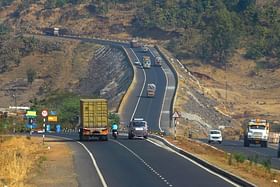In a breakthrough, the inaugural ceremony for India’s first National Highway steel slag road section on NH-66, linking Mumbai to Goa, took place last Saturday (13 January).
This highway signifies achievement in sustainable road construction technology, as it transforms waste from steel industries into a valuable resource for constructing strong and environmentally friendly national highways.
JSW Steel, under the CSIR-CRRI technological guidance, has constructed the 1 km long four lane steel slag road section on Indapur-Panvel Section of NH-66 Mumbai-Goa. For the construction of this road around 80,000 tons of CONARC Steel slag were converted as processed steel slag aggregates at JSW Steel Dolvi, Raigad plant.
The processed steel slag aggregates are superior to natural aggregates in terms of various mechanical properties and utilised for steel slag road construction in all layers of the road in place of natural aggregates. The road has a bituminous and cement concrete steel slag road section at same location in RHS and LHS carriageways.
On this road section, the processed steel slag aggregates and slag cement have been utilised for the construction of the cement concrete road in all layers.
Steel slag road technology is playing an important role in realising Prime Minister Narendra Modi’s mission of ‘Waste to Wealth’.
Steel slag roads have been shown to last ten years as opposed to three to four years for bitumen roads, significantly lowering maintenance expenses.
India has developed the world’s latest Steel Slag Road Technology, which allows for large-scale utilisation of waste slag from steel plants for road construction, according to Jitendra Singh, Union Minister of State (independent charge), Science and Technology.
The technology to use steel slag for road construction was created by the Council of Scientific and Industrial Research (CSIR)-Central Road Research Institute (CRRI), which aims to tackle the issue of slag generated by steel plants.
What is Steel Slag Road Technology?
The technology has been developed by the CSRI under a research project in collaboration with the Ministry of Steel, Government of India, and four major steel manufacturing companies of the country, viz., ArcelorMittal Nippon Steel, JSW Steel, Tata Steel and Rashtriya Ispat Nigam.
This technology facilitates the large-scale utilisation of waste steel slag in steel plants and has proved very useful in the effective disposal of about 19 million tonnes of steel slag generated in the country.
The advantages of steel slag roads. Not only are they approximately 30 per cent cheaper than conventional paving, but they are also more resilient and resistant to unpredictable weather conditions.
This new technological approach also addresses the issue of environmental degradation caused by waste steel slag and unsustainable natural aggregate mining and quarrying.
Steel slag roads have been shown to last ten years as opposed to three to four years for bitumen roads, significantly lowering maintenance expenses.
Scope for India
The abundance of steel slag generated as a byproduct of India’s steel industry presents a significant scope for the country.
Being recognised as the world’s second-largest steel producer, India currently produces around 19 million tons of steel slag annually, and this is expected to increase to 60 million tons by 2030. With approximately 200 kg of slag generated for every tonne of steel production, finding efficient disposal methods for steel slag is crucial to mitigate environmental challenges.
One of the major issues is the accumulation of large heaps of steel slag around steel plants, causing water, air, and land pollution.
To address this problem, the Steel Ministry is collaborating with the Ministry of Science and Technology and the Ministry of Road Transport and Highways to explore the potential of steel slag road technology across the country.
By utilising steel slag in road construction, India can turn this waste into a valuable resource and address both environmental and infrastructural concerns. Steel slag road technology has shown promise as a cost-effective and durable alternative to traditional materials like bituminous concrete, making it an attractive option for building resilient roads.
The scope for India lies in actively promoting the use of steel slag in various applications, particularly in road construction, which not only helps manage waste but also contributes to greener and cleaner infrastructure development.


